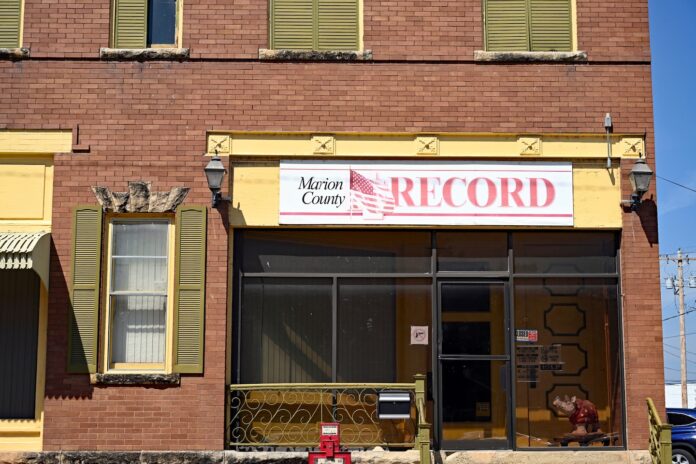Five officers led by Police Chief Gideon Cody and two sheriff’s deputies seized four computers from the Record’s office, disconnected its router, and also searched the home of co-owner and publisher Eric Meyer, making copies of his bank records and other personal materials. His 98-year-old mother, also co-owner, was distraught and died the next day. The home of Vice Mayor Ruth Herbel, 80, was also searched.
The police obtained a two-page warrant from Magistrate Judge Laura Viar, saying the police were acting on probable cause to believe that “identity theft” and “unlawful acts concerning computers” had been committed involving a local restaurateur, Kari Newell. According to the Record’s account, a source had given it information about Ms. Newell’s drunken-driving record, and a reporter had logged on to a state website to verify it. The reporter identified herself and confirmed the information about Ms. Newell. The newspaper concluded the information had come from Ms. Newell’s estranged husband and decided not to publish it. The information was relevant because Ms. Newell was seeking a liquor license from the city, and her history had been raised by Ms. Herbel at a recent city council session.
Separately, Mr. Meyer said the newspaper was investigating tips that the police chief, Mr. Cody, had left his previous job in Kansas City, Mo., to avoid repercussions for sexual misconduct allegations. Though the paper never published the information, details about the investigation — including the identities of Mr. Cody’s accusers — were in a computer seized by police.
These are the bread-and-butter activities of journalists: investigating, checking, holding officials to account. A police raid on the newspaper office is highly intrusive and seems entirely unwarranted. The search warrant is supposed to be accompanied by a probable cause affidavit supporting the search. The newspaper said it was not on file with the court. The county attorney, whose brother owns the hotel where Ms. Newell has her restaurant, refused to release it. Anyone examining these events must ask: Why was such a search necessary? The police could have instead sought information with a less-intrusive subpoena.
The federal Privacy Protection Act of 1980 protects the flow of information to journalists, barring law enforcement, including local agencies, from searching for or seizing reporters’ product or documentary materials. There are narrow exceptions, including when seizure is necessary to prevent a death or serious bodily injury or when there is probable cause to believe a journalist is committing crimes to which the materials relate. The Marion police cited this exception to justify their search. But the law says this exception does not apply to the “receipt, possession, communication, or withholding” of information.
A Kansas reporters’ shield law, passed in 2010, protects journalists from being held in contempt for “refusing to disclose, in any state or local proceeding, any information or the source of any such information procured while acting as a journalist.” The law says a journalist might have to reveal information for certain compelling interests such as preventing a miscarriage of justice or an imminent act that would cause death or great bodily harm. But that does not appear to be the case here.
The search raises real First Amendment concerns. As the Reporters Committee for Freedom of the Press noted in a letter, signed by The Post and more than 30 news organizations, the police raid “substantially interfered with the Record’s First Amendment-protected newsgathering” and risks “chilling the free flow of information in the public interest.” Freedom of the press and freedom of speech are at the core of U.S. democracy; these rights should be maximally protective of nosy reporters seeking the truth about sensitive public officials.



